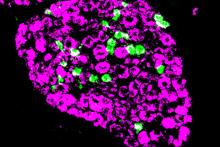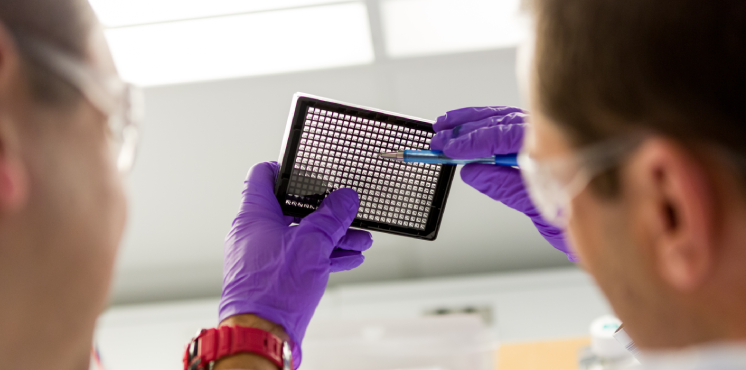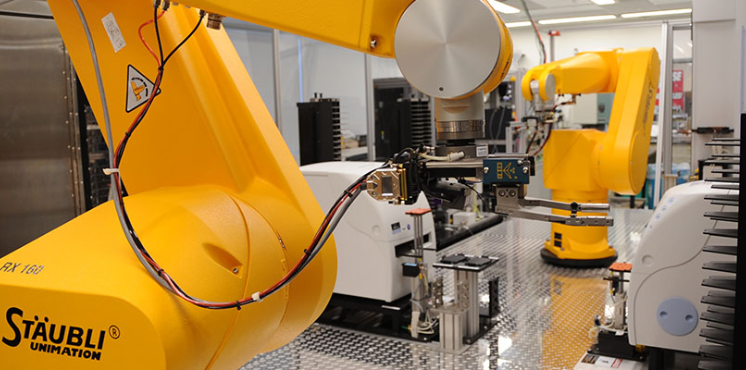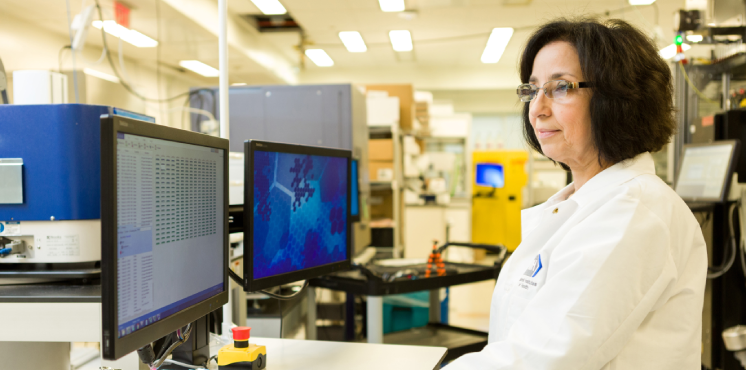Assay Development and Screening Technology (ADST)
The Assay Development and Screening Technology (ADST) program improves assay designs and screening methods for high-throughput small-molecule screening.
About ADST
Contact
One of the first steps in the drug development process is creating test systems — called assays — on which researchers review the effects of chemical compounds on cellular, molecular or biochemical processes of interest.
At NCATS, experts in the Assay Development and Screening Technology (ADST) program work to improve assays requested or submitted by the biomedical research community for high-throughput small-molecule screening.
High-throughput screening uses robotics, data processing and control software, liquid-handling devices, and sensitive detectors to allow scientists to quickly perform millions of chemical, genetic or pharmacological tests. The results of these screens can be used to further explore protein and cell functions and biological processes related to human health and disease. In addition, the tested compounds, called probes, can be developed further to become possible therapeutic candidates in the drug development pipeline.
We pursue advances in assay technology to expand our understanding of diseases and find possible treatment targets. The program’s scientists do much of this work in collaboration with various disease foundations. These partnerships involve foundation support for postdoctoral researchers to work in the ADST laboratory developing assays and conducting screens.
Program Goals
The goal of the ADST program is to advance therapeutic development through research and development of innovative assay designs and chemical library screening methods related to disease biology.
The program’s primary focus is on “gateway translation,” or bridging the gap between discovering how diseases work and beginning to develop drugs to treat them. This phase of discovery research is very important to disease advocacy organizations looking for new treatments for patients. The ADST program model is designed to overcome translational barriers in developing urgently needed treatments for diseases that are less.
Program Objectives
- Collaborate with disease foundations, NIH-funded investigators, international groups and the biopharmaceutical industry to develop strategies for early-stage translation and drug discovery
- Research how to develop more efficient assays and screening, including:
- Using disease knowledge and advances in molecular biology to develop assays that reproduce inherited mutations
- Creating analysis and progression methods for evaluating approved drugs and investigational compounds
- Developing ways to look for information in complex chemical libraries
- Provide training, grant support and outreach to improve the translational research skills of investigators, including:
- Offering unique postdoctoral training opportunities in partnership with disease foundations
- Supplying data packages for grant application support
- Reaching out to college conferences and advisory and review panels
Our Team



ADST News

An Itch to Scratch: NCATS, NIDCR Scientists Identify Potential New Approach to Chronic Problem
February 22, 2022 - NCATS News
- Assay Development and Screening Technology (ADST)
People with constantly itchy skin, take heart. NCATS and National Institute of Dental and Craniofacial Research scientists report that blocking a receptor on the surface of spinal cord neurons may help relieve the chronic need to scratch.
Read ArticleNew Method Could Help Find Potential Treatments for Rare Diseases
January 5, 2019 - NCATS News
- Assay Development and Screening Technology (ADST)
Scientists in NCATS’ Assay Development and Screening Technology Program are developing new methods for screening small molecules that could help researchers test possible drugs and develop new trea
ADST Scientific Capabilities
ADST program experts have a documented track record of developing entry-point high-throughput screening assays as well as secondary assays using state-of-the-art tools, technologies, platforms and chemical libraries. ADST program capabilities include:
- Development of assay design concepts
- Proof-of-concept testing
- Concentration response-based chemogenomic profiling for high-confidence primary data sets
- Collaborative assembly of preliminary high-throughput screening assay validation studies
Work With Us
If you have a specific need related to developing assay and screening methods, work with us!
Submit a request to Manju Swaroop with the following details:
- A summary of your idea/vision
- Research goals
- Project needs
- Your level or area of biology expertise
Related Research

Assay Guidance Manual
We offer online resources and workshops to help others develop robust and effective early-stage drug discovery assays.

Automation
Our automation experts work closely with our scientists to support various research activities, including high-throughput screening and assay development and optimization.

Compound Management
Our compound management team uses sophisticated and automated techniques to support NCATS screening activities.


